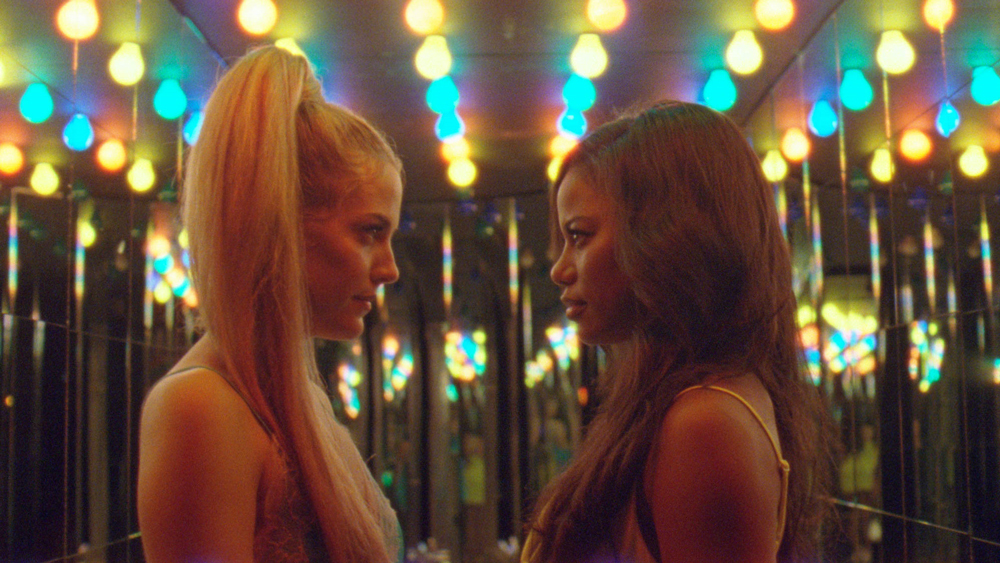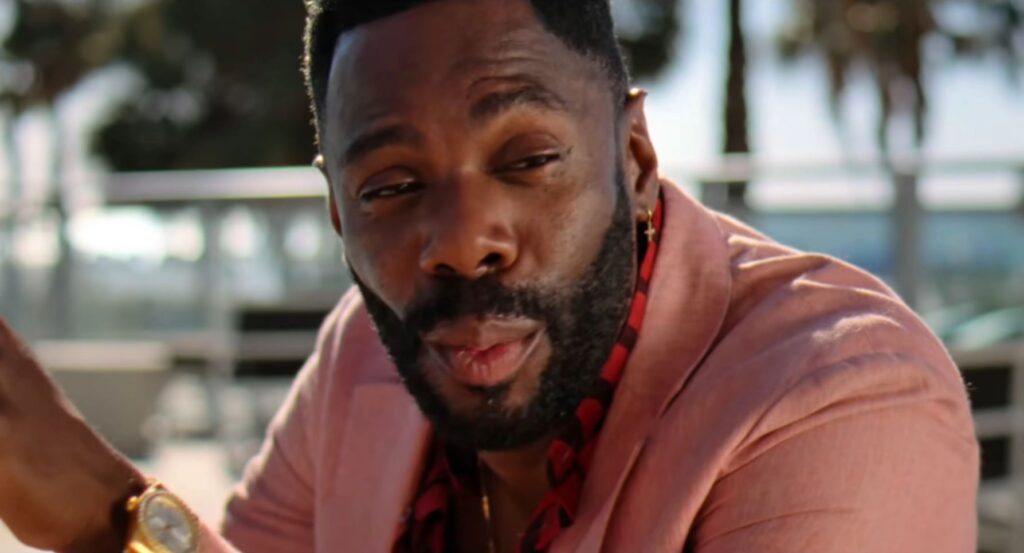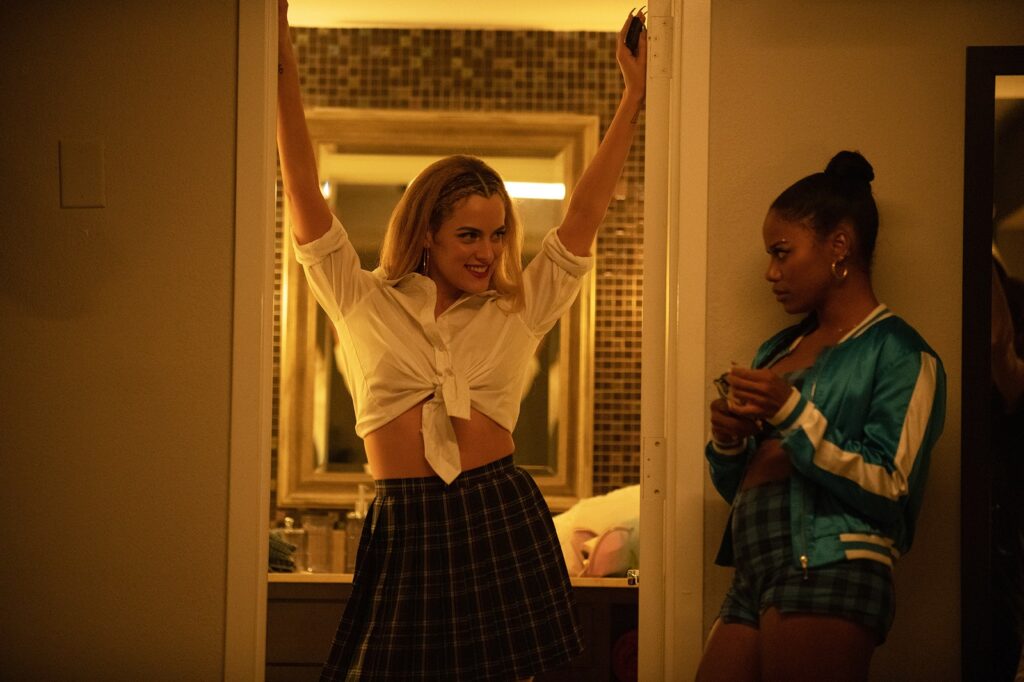
Almost Famous may have immortalized the trope of passengers giddily belting out a classic pop song, but Zola, the indecently entertaining new film from Janicza Bravo, revives the conceit and reinvests it with a distinctly modern sensibility. In an early scene that finds four strivers cruising south from Detroit to Tampa, a young man cues up Migos’ “Hannah Montana” and starts enthusiastically bobbing along to the beat. At first he seems foolish (in no small part because he’s played by Nicholas Braun, aka Cousin Greg from Succession), but before long his gusto infects his fellow travelers, who join him in a rambunctious display of lip-synching and tongue-wagging. The mood is jubilant but also performative, the gesticulators constantly posing for pics and racking up the likes on Instagram. It’s a celebration that’s simultaneously authentic and synthetic.
This preoccupation with digital gratification—a mingling of heedless joy and self-conscious artistry—doesn’t belong exclusively to the characters; it’s embedded in the movie’s very DNA. Zola was born from Twitter, specifically a viral 148-tweet thread from A’Ziah “Zola” King, who in October 2015 tapped out on her phone an emoji-laced saga of vice, mayhem, and betrayal. (The reporter David Kushner quickly turned it into an article for Rolling Stone.) A sprawling collection of 140-character missives may seem like bare bones for a feature film, but one of the lessons of the technological age is that art can come from anywhere. And Zola, as brought to the screen by Bravo and co-writer Jeremy O. Harris, is a proudly contemporary picture that also draws from classic cinematic influences. As the saying goes, all you need to make a movie is a girl, a gun, and a smartphone to orchestrate your illicit prostitution scheme.
We’ll get to that. What matters in Zola is less the cockamamie plot than the visual style and imagination. Making just her second feature but having already directed episodes of a half-dozen acclaimed TV series (including Atlanta, Mrs. America, and In Treatment), Bravo imbues the film with an emphatically new-age personality: playful, glitzy, and aggressive. There are mirror shots, freeze frames, and montages. The lighting is all hot-pink and neon, while the soundtrack constantly chirps with the alerts of new messages and notifications; Mica Levi’s inventive and immersive score leans heavily on electronic bells and whistles. During one tense scene, the screen suddenly darkens, and then tendrils of kaleidoscopic light emerge, like the visualizer for an old PC media player.

There’s no real reason for that last flourish, and on occasion—as when the camera lingers on the asses of two women as they urinate in adjoining stalls—Bravo’s showmanship feels untethered from her storytelling. Overall, though, Zola’s brio is absorbing, pulling you inside its sordid tale of iniquity and corruption. In her opening voiceover, the title character (played by an impressive Taylour Paige) describes the forthcoming narrative as “full of suspense”, but the movie’s panache actually serves to dilute its intensity. That’s probably a good thing, because without the adorning cinematic makeup, the events on such energetic display here would look ugly and more than a little disturbing.
Part road-trip movie, part weekend-gone-wrong odyssey (there are shades of Spring Breakers—James Franco was originally attached to direct), Zola opens with an encounter between Paige’s waitress, who moonlights as an exotic dancer, and Stefani (an electrifying Riley Keough), a chatty customer who also works the pole and who recognizes Zola from a local club. Stefani is, in the parlance of the characters’ vernacular, rather extra; she has cotton-candy claws in place of fingernails, her blond hair is tightly braided with hints of dreads, and she speaks in an exaggerated blaccent that initially causes Zola’s eyebrows to fly up to the top or her skull. But she’s sexy and friendly, and more importantly, she seems to have a gift for making money. So when she texts Zola the next day and regales her with promises of making significant cash down south, our heroine can hardly resist, and soon she’s piling into a sedan that’s headed from Michigan to Florida. Also in tow: Stefani’s boyfriend, Derrek (Braun), and their “roommate” (Colman Domingo), whose role in this enterprise is so enigmatic that even his name is a mystery.

What follows is a garish spectacle of sex and violence, blending together affected machismo, legitimate cruelty, and bare flesh. Thematically, Zola attempts to function as both an ardent defense of sex work and a chilling indictment of sex trafficking. As dancers, Zola and Stefani are reasonably empowered, wielding their beauty and athleticism for well-deserved profit. (There are even rules to follow; Zola is stunned to learn that one establishment requires “pasties and panties” to comport with state law.) But as their weekend in Florida goes on, the exchange of money for services grows more intimate and more dangerous; when one potential client bluntly admits, “We savages, miss,” the ironic appellation only makes the ensuing transaction that much more vulgar. As things progress (regress?), Zola, once so confident and brash, becomes a worried and passive observer, while Stefani seems to flit between willing participant and helpless victim.
This blurriness in character doesn’t strike me as entirely intentional. Sure, Bravo handles the ostensibly lewd sequences with an arresting flair that thwarts the possibility of unpleasantness; a vertical montage of johns peeling off their shorts, the camera briskly panning downward from one limp penis to the next, is memorable for both its style and its frankness. But she’s nonetheless hemmed in by the boundaries of her source material. In its third act, Zola seeks to ramp up the tension—more guns, more threats, more bloodshed—but it struggles to cohere as a fully formed story. The relationship between Zola and Stefani should form the film’s emotional backbone—it initially plays as a portrait of feminine solidarity, only to bleed into something more antagonistic—yet it never feels properly fleshed out.
The main reason to see Zola, besides Bravo’s assertive craft (and maybe your sheer curiosity over how on earth a Twitter thread got turned into a movie), is the quality of the acting. Braun, with his backward baseball cap and feeble chinstrap, is appropriately pathetic, while Domingo, sporting a single green contact lens and sporadically deploying a Nigerian accent, exhibits an unpredictability that’s genuinely frightening. But the leading ladies are the main attraction. Paige has the trickier job, as Zola is essentially the straight woman floating in a sea of weirdness; she serves as our translator as well as our narrator, explaining the significance of seemingly trivial remarks like, “He takes care of me.” (She also speeds us past a few sex scenes, efficiently summarizing several with the line, “They start fucking, it was gross.”) With admirable steadiness, Paige highlights Zola’s pragmatism, allowing us to sympathize with her as she gets far more than she bargained for.

What we get, most deliciously, is Keough’s performance. Stefani is a bundle of contradictions—a white woman who talks like she’s Black, a plaything who might also be a predator—and while Keough can’t entirely resolve the character’s ambiguity, she can make her mesmerizing, with flashing eyes that signal both vivacity and vulnerability. Vapid and clueless but also cheerful and oddly sweet, Stefani is way too much for anyone to handle; the brilliance of Keough’s work is how she underlines the character’s ugliest tendencies while simultaneously conveying her sincere bafflement that Zola might not want to be her best friend.
That’s why, while it’s clearly Zola’s story, Zola’s best moment arrives when it transforms into a different movie entirely. Midway through the film, in a bold and breathtaking sequence, Bravo reimagines Stefani as the picture’s central character, drawing from posts that the character’s real-life counterpart made on Reddit. It’s a brief but thrilling digression, and it creates a tantalizing sense of possibility about how movies can be structured. At this point, it’s uncertain whether Zola will fuel a craze of similar web-to-film adaptations or if its bizarre journey to the screen will go unimitated. But regardless of how many cinematic retweets it inspires, in exhilarating scenes like this, it remains decidedly one of a kind.
Grade: B
Jeremy Beck is the editor-in-chief of MovieManifesto. He watches more movies and television than he probably should.
